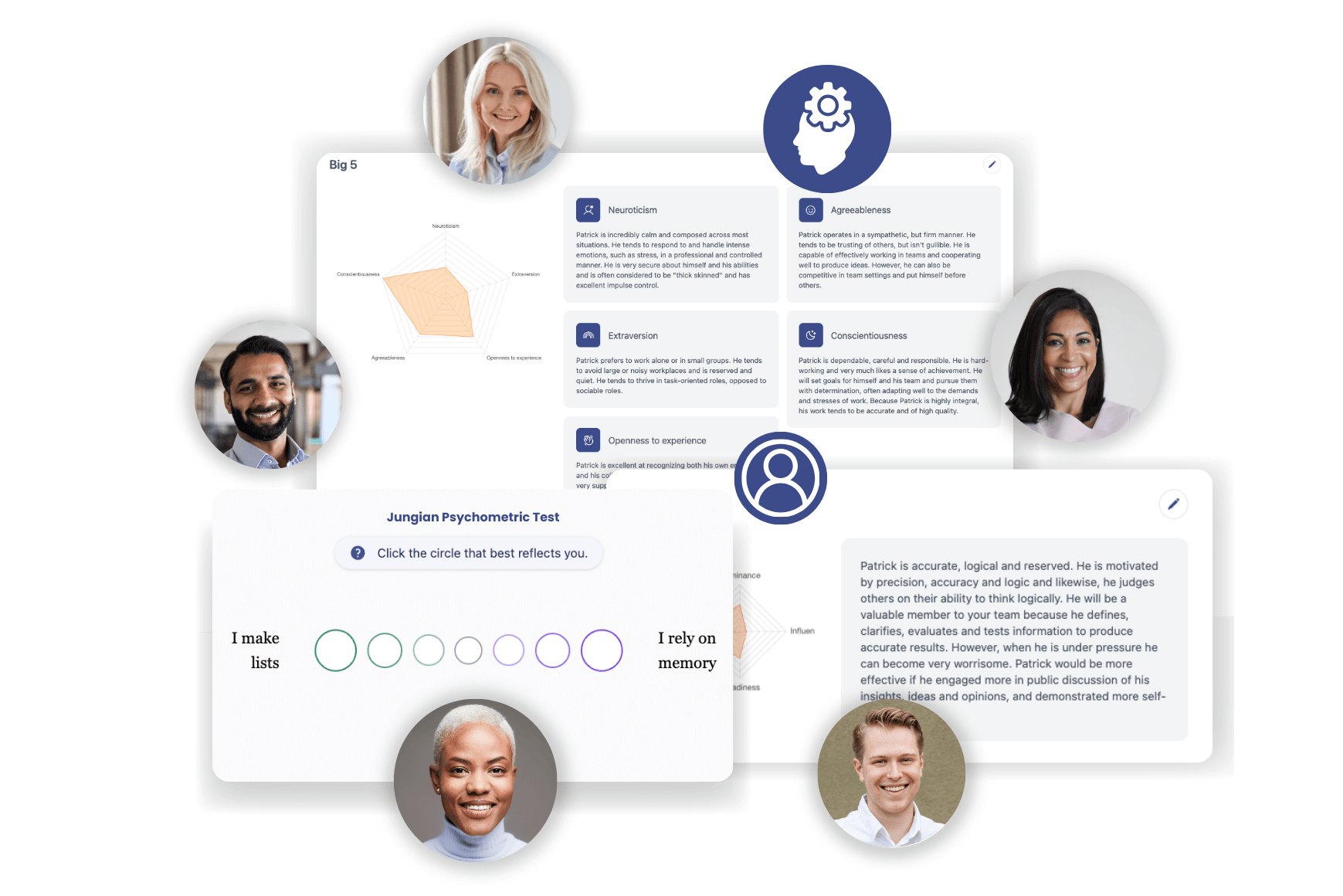Personality tests are a great way for employers to learn more about their employees - what motivates them, how they prefer to communicate and receive feedback, how they process information, and so on.
Not only do personality tests allow employers to get to know their team better and make more thoughtful decisions, but they’re also a great opportunity for team building and improving employee engagement.
After all, having some insight into your employees’ behaviors and preferences can guide you toward building a workplace where everyone can do their best and feel valued.
That being said, due to the overwhelming amount of such tests available nowadays, choosing the right personality tests for teams may be a challenge. And this is where we step in with our article on the 10 best personality tests for teams.
What Is a Personality Test?
A personality test is defined as a tool used to assess human personality. Personality testing and assessment refer to techniques designed to measure the characteristic patterns of traits that people exhibit across various situations.
Personality tests can be used to help clarify a clinical diagnosis, guide therapeutic interventions, and help predict how people may respond in different situations.
Namely, since personality testing is designed to measure certain behavior patterns, characteristics, and human traits in a wide range of situations, it goes without saying that employers such as yourself are interested in learning about all those patterns and traits in a work environment context.
More importantly, such assessments are insightful for your employees, too - they let your workers get to know themselves better so they can make better use of their strengths and understand their behavioral patterns.
That said, not all personality tests are equally valid or credible, which is why we compiled a list of the most reliable personality tests for teams.
—
If you’re looking for a tool that combines multiple results in one platform, you should check out QuizBreaker. The platform lets you take three of the most influential personality tests, namely:
-
Big 5
-
DiSC Assessment
-
Jungian
It then compiles these with other data and features, including:
-
Working style personality profiles;
-
Icebreaker quizzes;
-
Pulse survey systems; and
-
Fun icebreaker and team-building games like multiplayer trivia and escape games.
Try QuizBreaker for Free Today
The 12 Best Personality Tests for Teams
In the following paragraphs, we’ll provide an in-depth explanation of what each test measures, how they came to be, and everything else worth mentioning, so let’s get into it.
1. Myers Briggs Personality Test (MBTI)
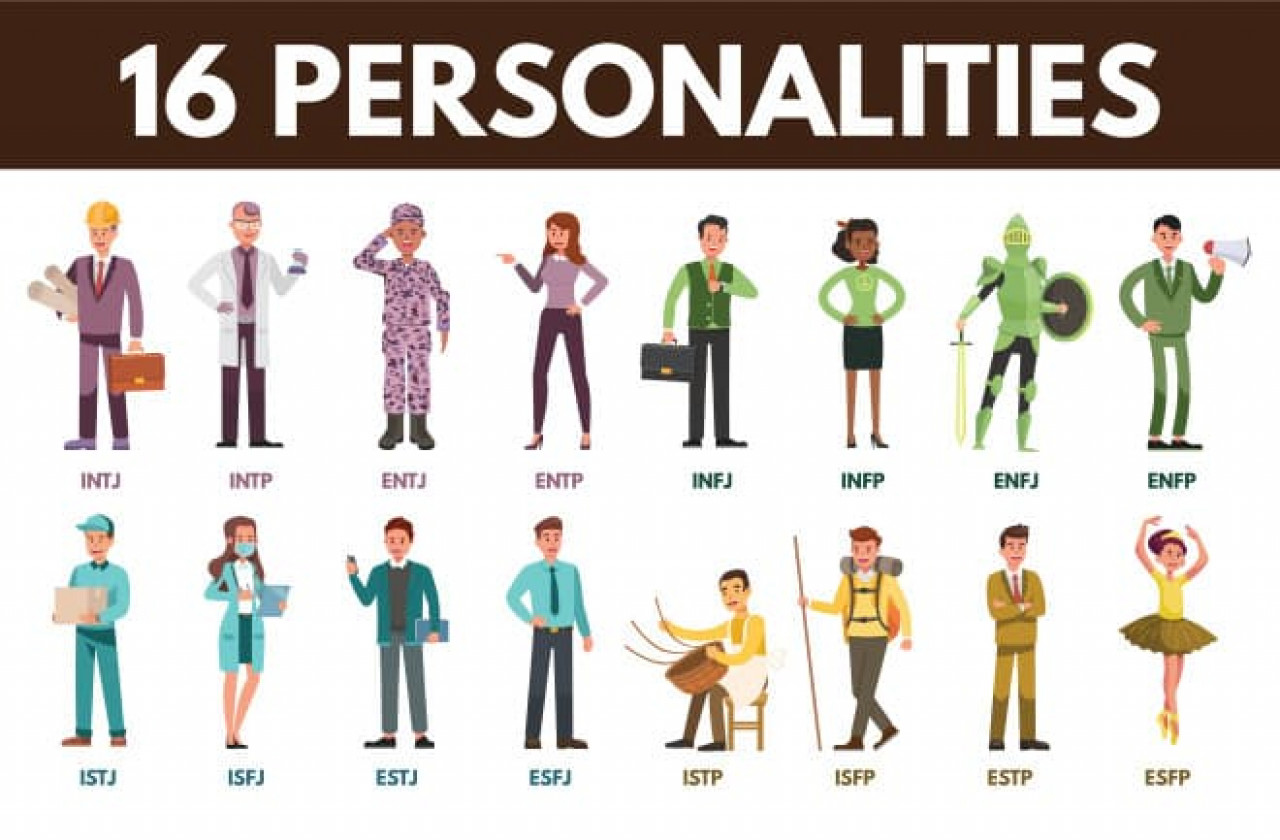
Best For: Teams seeking to improve understanding and cooperation among diverse personality types
The Myers-Briggs Type Indicator was developed by Isabel Briggs Myers and her mother, Katharine Briggs. Their aim was to help people comprehend personality differences among the general population. In essence, they believed these types of personality assessments could help individuals understand their strengths and weaknesses more, as well as the ways in which they differ from others.
The Myers-Briggs test shows 16 personality types to show a person’s psychological preferences based on the following four categories:
-
Extraversion (E) or Introversion (I): Are you someone who’s more focused on the outer world (E) or are you nursing your inner one more (I)?
-
Sensing (S) or Intuition (N): Are you someone who’s more focused on receiving information through their five senses (S) or do you pay more attention to the impressions and the actual patterns of the information you receive from others (N)?
-
Thinking (T) or Feeling (F): How do you usually make decisions? Do you focus more on the facts and your reasoning (T) or are you more concerned with the individuals involved along with your current emotions (F)?
-
Judging (J) or Perceiving (P): Do you observe the world in a structured manner (J) or are your views much more flexible and adaptable (P)?
Apart from these four categories, we need to mention the sixteen distinct personality types that arise due to how these preferences interact with each other. Here they are: ESTJ, ENTJ, ESFJ, ENFJ, ISTJ, ISFJ, INTJ, INFJ, ESTP, ESFP, ENTP, ENFP, ISTP, ISFP, INTP and INFP.
We understand the random letters may seem confusing at first (especially if you don’t know what this whole thing is about), but there’s a detailed description for each personality trait.
So let’s say you end up being an ISFJ type, here’s a short sample of the explanation you’ll get: “Quiet, friendly, responsible, and conscientious. Committed and steady in meeting their obligations. Thorough, painstaking, and accurate. Loyal, considerate, notice and remember specifics about people who are important to them, concerned with how others feel” [...].
Finally, the whole point of knowing one’s personality type is comprehending and accepting the differences that exist among people. All types matter equally - there’s no best type or better type. As Isabel Briggs Myers put it: "It is up to each person to recognize his or her true preferences."
Why We Love This Test for Teams
MBTI is fantastic for team building because it divides personalities into 16 clear and distinct types that really resonate well with test takers. When we first took it as a team, it gave us all a clear "this is so me!" moment.
Each type has unique communication styles and work preferences. A deep dive into MBTI results can really help your teams appreciate the diversity of thought and approach. We've seen it create more empathetic and tailored interactions within organizations.
Where Can I Find This Test?
The Myers-Briggs assessment is available on 16Personalities. You can also take a similar test called the Jungian on QuizBreaker.
2. Big 5 Personality Test

Best For: Teams interested in a broad and scientifically validated overview of personality traits
The Big Five.
The Five Factor.
The O.C.E.A.N model of personality.
They’re all ways of explaining the very same theory of personality; many studies have concluded that the differences among people's personalities can be structured into five broader categories, referred to as the Big Five (or the Five Factors). In other words, these five categories are actually five very broad dimensions of a person’s personality, which this test measures.
And here they are in greater detail:
-
Openness refers to how open people are to new experiences, ideas, and other people. People with this trait have a lot of imagination, insight, and eagerness to learn new stuff. It’s all about leaving one’s comfort zone and trying out a new non-traditional way of doing things.
-
Conscientiousness denotes how persistent, organized, and thoughtful a person is. People with this trait plan ahead, analyze their own behavior (as well as how it affects others), and usually stick to schedules and structure.
-
Extraversion shows how much an individual is energized in the presence of other people. Such people are talkative, have no problem being the center of attention, know many people, and express their thoughts and feelings quite openly.
-
Agreeableness is a trait that people with altruistic tendencies possess. They’re also very affectionate, kind, and trustworthy. These individuals have no problem putting other people’s needs ahead of their own.
-
Neuroticism is all about sadness, moodiness, and extreme sensitivity when it comes to processing one's emotions. Such individuals deal with a lot of anxiety, emotional irritability, and have a lot of emotional triggers in their lives.
On the whole, the Big Five personality model has been widely recognized as one of the best ways of describing personality differences. In fact, the test has been researched quite extensively, so its validity and accuracy have been thoroughly studied and analyzed.
This is definitely one of the best personality tests for teams - both for new hires and current employees. For instance, if you test new workers, the test results can help you predict what type of worker you’re dealing with, what type of behavior you can expect, and how this person will fit in with the rest of the team members. If you decide to test current employees, you can predict future job performance and productivity levels and how they contribute to the current work environment.
And if you’re curious about how your personality as an employer impacts your life and your company as well, we recommend that you take the test, too!
Why We Love This Test for Teams
We love Big 5 because it offers such a clear and concise framework: five major dimensions of personality. Easy to remember. Teams love using OCEAN for its predictive power regarding team dynamics and job performance. Undoubtedly, it's a clear favorite for creating well-rounded and effective teams.
Where Can I Find This Test?
There are many places where you can find this test, like QuizBreaker.
3. DiSC Assessment

Best For: Perfect for teams looking to enhance workplace communication and leadership skills
The DiSC personality assessment is a simple yet impactful personality testing tool that helps teams determine how best to work with each other by lining up four easy-to-remember profiles:
The acronym DISC stands for the four primary personality profiles:
-
Dominance. Individuals who score high in the Dominance category are confident, assertive, and results-oriented. They are direct in their communication and prefer to have control over situations and their surroundings.
-
Influence. People with high Influence scores are enthusiastic, optimistic, and sociable. They thrive in social situations and are great at influencing or persuading others.
-
Steadiness. Those who are strong in Steadiness are calm, dependable, and consistent. They value relationships, are patient, and are often seen as great team players.
-
Conscientiousness. Individuals with a high Conscientiousness profile are analytical, detail-oriented, and systematic. They prioritize accuracy and have a methodical approach to tasks.
Each individual can exhibit traits from more than one profile, and often a blend of these primary types can provide a more comprehensive understanding of a person's behavioral style. For instance, someone might be a high "DI," meaning they're dominant but also influential, making them both assertive and sociable.
Many businesses use the DISC assessment for various purposes, including hiring, team-building, and improving communication within teams. It helps individuals understand their behavior, learn how to adapt to different situations, and improve interactions with others.
Why We Love This Test for Teams
DiSC helps teams navigate interpersonal relationships and builds a culture of understanding and respect. It also provides a clear and simple framework for how someone with a certain theme might work or lead best.
For example, a dominant leader will lead in a way completely different from how an influential leader would. DISC makes that abundantly clear and allows you to work and lead in the way your team members would best.
Where Can I Find This Test?
The test is part of the workplace personality testing for teams feature on QuizBreaker.
4. Emotional Intelligence Test

Best For: Teams that prioritize leadership development and emotional awareness
Take a look at the following stats:
-
59% of employers won’t hire a person with a low EQ even if they have a high IQ;
-
75% of employers claim they’re more likely to promote an employee with high EQ;
-
a Levo Institute survey suggests that 80% of workers perceive EQ to be crucial when it comes to developing their careers;
-
workers with high EQ make $29,000 more at an annual level than those with low EQ;
-
companies with high EQ leaders are much more likely to be more profitable.
Such stats show you that if you’ve been neglecting EQ in the office, it is time to prioritize it.
As you can see, emotional intelligence (also known as emotional quotient or EQ) is important in the workplace, and testing your employees’ EQ is a great step toward starting one’s process of self-discovery and self-assessment.
And that’s precisely what the tests we linked in the next section will show you (if you decide your workers should take them, of course).
For instance, the Emotional Intelligence Test provides test-takers with 40 questions, based on Daniel Goleman’s Emotional Intelligence Competency Model. Assessments such as this one are meant to show test-takers in which areas they’re doing well, and which ones need a bit of (or a lot of) improvement. The test typically takes around 10 minutes to complete.
Why We Love This Test for Teams
These tests measure how well individuals recognize and manage their own and others' emotions- a key skill in leadership and collaborative environments. They also create a more compassionate and supportive team atmosphere.
Where Can I Find This Test?
As part of a WorkStyle license, we provide users with an occupational emotional intelligence test.
5. MyPersonality Test
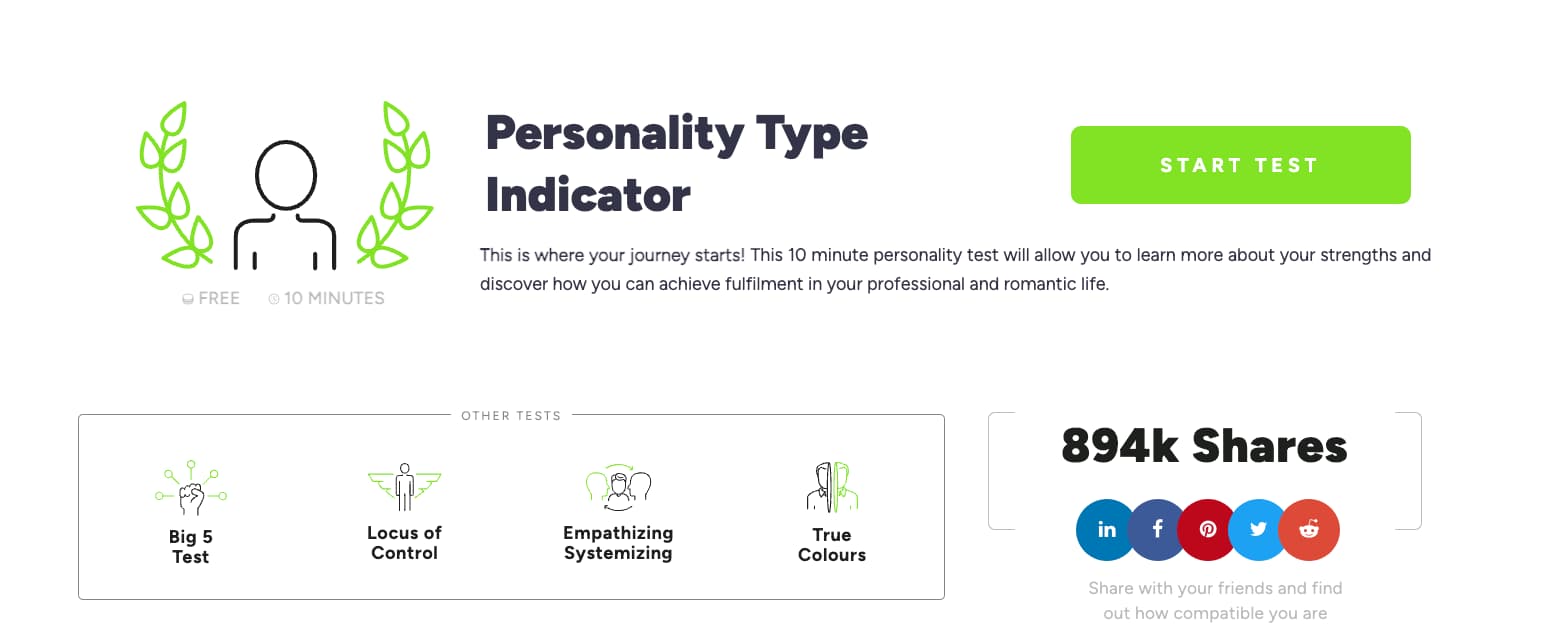
Best For: Great for teams that enjoy engaging and interactive tools to learn about each other
MyPersonality Test is a test that can help your team members understand how they react to both planned and unexpected events and situations. Such personality assessments can help them learn how to make some changes in their lives and adjust to the circumstances accordingly.
This is a free, 10-minute test that comes with many valuable insights and details about one’s strengths, which can assist your workers in achieving their full potential at work.
Why We Love This Test for Teams
MyPersonality Test is user-friendly and provides insightful results that spark discussions and personal reflections, making team building sessions both fun and informative.
Where Can I Find This Test?
You can find this test here.
6. Berkeley Emotional Intelligence Quiz
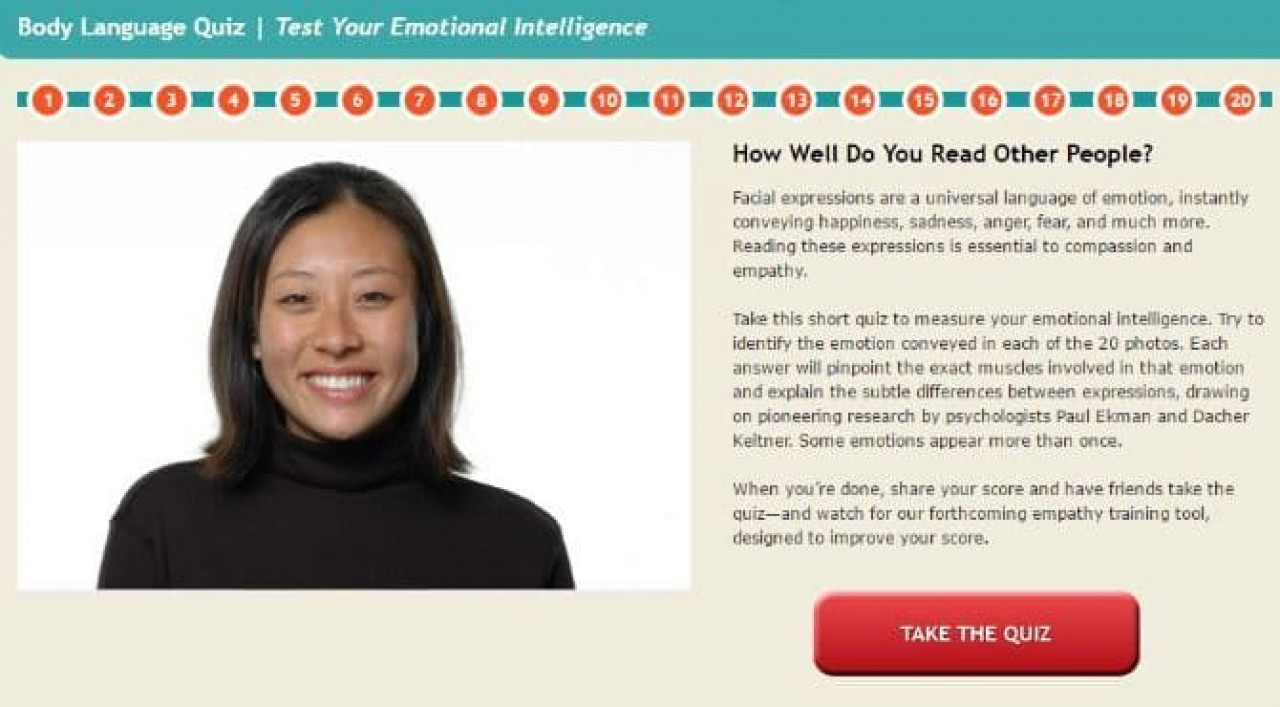
Best For: Teams needing to deepen their understanding of emotional intelligence in practical settings.
The Berkeley Emotional Intelligence Quiz helps test-takers understand how well they read other people. This is a more visual assessment compared to the rest of the personality tests on our list because it includes photos.
This test doesn’t come with lengthy reports or extremely detailed explanations. Its results are concise and to the point. People get the answers straight away and understand their scores very clearly.
The photos provide individuals with a fun experience, or at least a different one from what they’re usually used to when it comes to such assessments. The whole point behind the images is that people are required to “read” a face and comprehend a specific facial expression.
For instance, if the test-taker is asked to determine whether a face denotes anger, shame, sadness, or frustration, and they provide a few wrong answers (and the correct option was “shame”), they’ll realize they have trouble understanding if someone is feeling ashamed.
This is very important in all corporate contexts, as understanding a person’s body language and facial expressions is crucial during meetings, discussions, presentations, and so on. And it’s not just about communication with colleagues - it’s about client interaction, too.
So, the better your workers are at identifying emotions, the better their overall communication skills will be.
Why We Love This Test for Teams
Developed by top psychologists, this quiz offers actionable insights into how well team members perceive and express emotions. This is, in fact, highly crucial for fostering a harmonious and productive workplace.
Where Can I Find This Test?
You can take the Berkeley Emotional Intelligence Quiz on the following website.
7. Enneagram

Best For: Teams interested in exploring deeper psychological motivations and personality dynamics
The Enneagram provides personality assessments based on interconnected dominant traits. There are nine unique personality types, each dealing with a particular human trait.
Here are the nine Enneagram types:
-
Type 1: Idealist: This type often looks for reform and moralistic behavior. The people who belong to this group are determined individuals and keen on helping others.
-
Type 2: Caregiver: Those who identify with this Enneagram type are generous and warm-hearted. They’re very emotional and expect affection from others.
-
Type 3: Performer: People who identify with this type are ambitious and quite energetic beings. They wish to achieve many great things in life and expect affirmation from those around them.
-
Type 4: Creative: These individuals are always on the lookout for authenticity and creativity, and have a passion for art in all forms.
-
Type 5: Thinker: This is a person who mostly spends their life independently. They’re deep thinkers (hence the type’s name), and are very introspective and curious.
-
Type 6: Loyalist: A loyalist is a person who appreciates consistency and safety. They are cautious, make informed decisions, and people can count on them.
-
Type 7: Adventurer: Adventurers want to experience everything life has to offer. They want to have fun, take action, and have exciting and unusual experiences.
-
Type 8: Protector: These people are very strong, make quick and effective decisions, and want to have control over their life. A person who’s a Protector is a confident individual who knows how to make others follow them.
-
Type 9: Peacekeeper: Such people want to feel safe, at peace, and comfortable. They have an optimistic approach to life and can consider different perspectives.
Although there are big unique aspects among all these different personality types, there are so-called “wings” or variations within each. These wings explain that, for instance, although a person may be predominantly a type 1, they may share some qualities and traits with Thinkers and Loyalists.
This is what makes Enneagram tests a great tool for employers dealing with new hires, especially if they’re not sure of the team they’ll fit in the best.
Why We Love This Test for Teams
The Enneagram’s focus on core motivations and interpersonal dynamics makes it a powerful tool for personal growth and team cohesion. We especially love it for its depth and the nuanced understanding it offers into our team members' behaviors.
Where Can I Find This Test?
You can find this test on Truity.
8. Jung Personality Test

Best For: Teams that value deep psychological insights linked to workplace behaviors
The Jung Personality test is the result of the work of the well-known Swiss psychiatrist, Carl Gustav Jung.
In general, tests that use this type of Jung typology model are said to be widely recognized by institutions for team-building, personal development, personality assessments purposes, and so on.
This test resembles the Myers-Briggs Type Indicator and seeks to answer the following questions:
-
What kind of personality do I have?
-
What are my Jung types?
-
How will my personality type fit certain kinds of jobs?
In general, the Jung Personality Test measures a person’s preferences regarding how they deal with people, make decisions, organize their lives, and process information.
The test results give a detailed overview of people’s behaviors and personality traits. And this might be just the insight you need into your employees’ characters.
Why We Love This Test for Teams
This test provides some of the most profound insights we've found into how different personalities perceive the world and make decisions. Using this test help us create more mutual respect and communication within our team.
Where Can I Find This Test?
You can find the Jung Personality Test on this website, or you can take the Jungian test if you sign up to QuizBreaker.
9. John’s Personality Test

Best For: Teams looking for a straightforward and quick assessment of personality traits
The John’s Personality test is another personality test for teams whose results are based on the Myers-Briggs Indicator.
And while the Myers-Briggs Indicator has 16 types, this test considers only 5 of them, including:
-
ISFJ;
-
ISTJ;
-
ISFP;
-
ESFJ;
-
and INFJ.
This test is made up of around 25 questions and here’s the interesting thing - test-takers can skip a question if they don’t quite resonate with it or simply don’t think it’s an adequate question for them.
Some of these questions are based on how people react to the individuals around them and others on their emotions.
That being said, this test isn’t for you or your team members if you expect extremely detailed personality trait insights. In essence, John’s Personality Test is a great option for pre-employment screening, for instance, as it allows employers to check whether a person is the right fit for their company. Also, it lets you know if this potential new hire is compatible with the rest of your workers.
Why We Love This Test for Teams
We foudn this test very straightforward, easy to administer. And it also provides immediate results. It’s a great starter tool for teams beginning to explore personality dynamics.
Where Can I Find This Test?
Follow this link to take the John’s Personality Test.
10. Eysenck Personality Inventory

Best For: Teams that are interested in temperament and its impact on work style
The Eysenck Personality Inventory is a questionnaire that assesses the personality traits of people, developed by Sybil B.G. Eysenck and Hans Jürgen Eysenck (both psychologists).
The test is based on Hans’ research findings - the fact that a person’s personality consists of three main elements known as extroversion, neuroticism, and psychoticism. This is something Hans seemed to have discovered through statistical analysis and very thorough research.
That said, current research tends to agree less on the third element (psychoticism), however, that aspect continues to play a big role in the questionnaires people take.
To better clarify the three elements, we’ll include a list of some of the most common feelings associated with each trait:
-
Extroversion: lack of reflection, impulsive, sociable, dominant, risk-taking, active, and expressive;
-
Neuroticism: depressed, anxious, low self-esteem, moody, tense, and obsessive;
-
Psychoticism: manipulative, egocentric, aggressive, masculine, and assertive.
Why We Love This Test for Teams
This inventory categorizes personalities based on temperament types, providing insights into how these traits can influence workplace behavior and team interactions, leading to better role alignment and task delegation.
Where Can I Find This Test?
The test is available here.
11. CliftonStrengths (StrengthsFinder)

Best For: Teams focusing on maximizing each member's strengths rather than weaknesses.
The CliftonStrengths assessment, formerly referred to as the StrengthsFinder, was developed by Donald Clifton, an educational psychologist.
Clifton was eager to identify the strengths that make high performers exceptional and stand out, which resulted in the creation of this personality test.
What makes this assessment one of the best personality tests for teams out there is its Gallup-Certifed Strengths Coaching Program. This is a coaching certification that brings novelty and a rather fresh approach to coaching as a concept.
When it comes to the actual assessment, it’s worth noting that this is an hour-long test with 177 paired statements. What’s interesting, though, is that test-takers are given only 20 seconds to answer a statement before the test automatically moves to the next one so they don’t overthink their answers.
After the assignment is completed, each test-taker gets a customized CliftonStrenghts report.
The test helps determine the so-called ranking order of 34 distinct themes which explain a specific personality type, divided into 4 categories - strategic thinking, relationship building, influencing, and executing.
These traits could be one’s strengths or areas of improvement and should help test-takers understand what makes them the way they are (their unique traits combination and authentic behavior).
The CliftonStrenghts assessment is great for employers who wish to discover their top talents and understand what makes these workers so special. It’s also great for employers to learn extra details about their employees’ strengths.
Overall, the whole purpose behind the CliftonStrengths assessment is to help employers boost their employee engagement levels by assigning roles and delegating tasks based on their workers’ strengths.
Finally, we only like to add that more than 90% of Fortune 500 Companies are said to have used CliftonStrengths, which is why it’s the first personality test on our list.
Why We Love This Test for Teams
CliftonStrengths helps individuals uncover their top talents and ecourages a team environment where everyone can play to their strengths. While it doesn't show your "strengths," it shows you the themes that will help you shine best.
We also like that the themes are grouped into four practical domains, namely strategic thinking, relatioship, influence, and execution. It gives a lot of clarity on how you can leverage those domains to fix bottlenecks in your organization.
Where Can I Find This Test?
You can purchase the CliftonStrenghts test on their official website.
12. Color Code Test
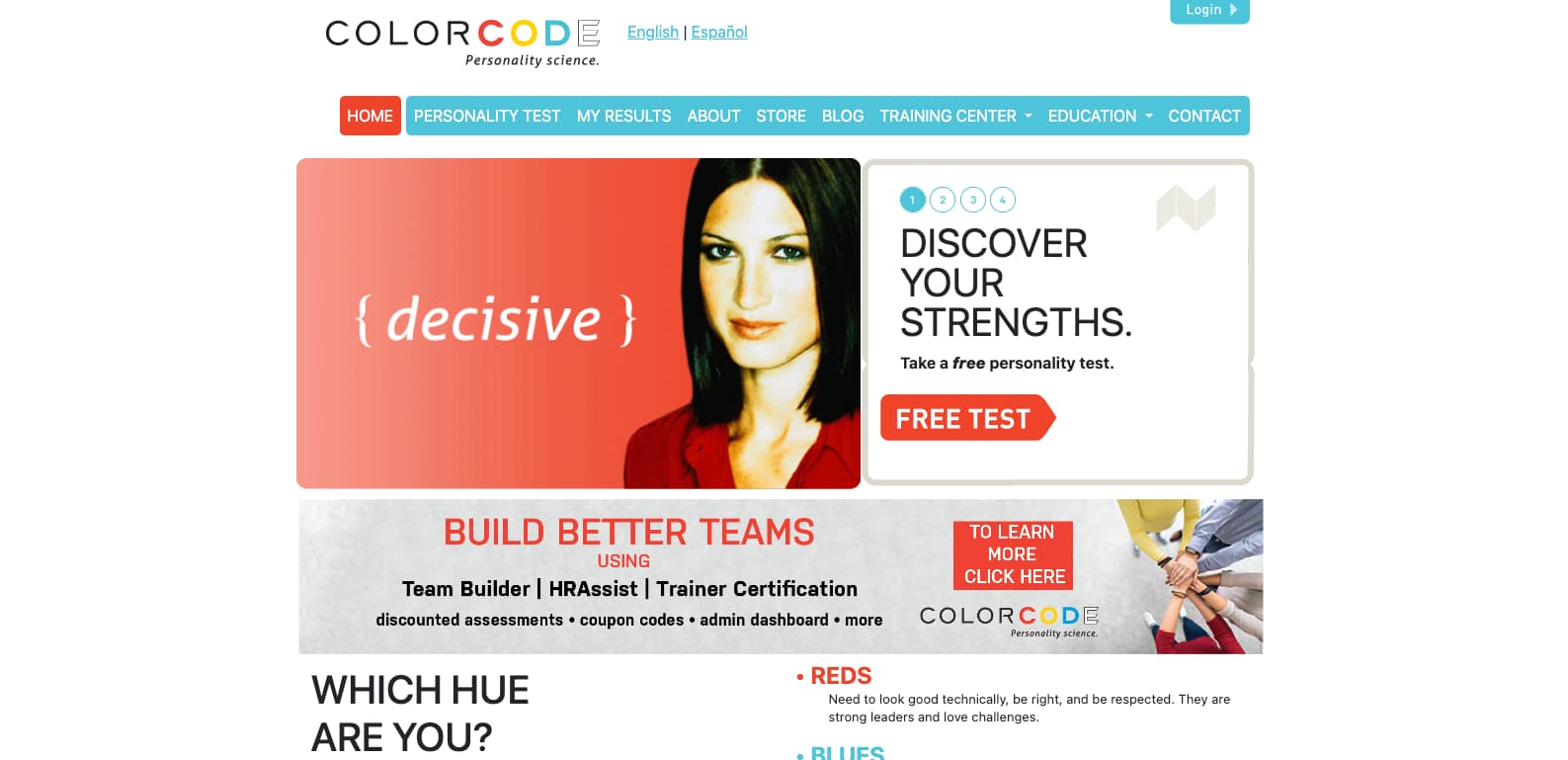
Best For: Teams looking for an intuitive and easy-to-understand personality model
The Color Code Personality Test, often called simply the "Color Code," is another personality typing tool that categorizes individuals based on their innate, core motives.
Developed by Dr. Taylor Hartman, this test classifies personalities into four primary colors, each representing a distinct set of characteristics. It's different from many other assessments because it strives to identify the driving core motive from birth rather than behaviors that have been adapted or learned over time.
The color code personalities are:
-
Red (The Power Wielder). Reds are motivated by power. They seek productivity and need to look good to others. Naturally, Reds are visionaries and can be very self-confident.
-
Blue (The Do-Gooder). Blues are motivated by intimacy. They seek to connect with others and be understood and appreciated genuinely. They are typically nurturing, sincere, and value quality in their relationships.
-
White (The Peacekeeper). Whites are motivated by peace. They seek independence and require kindness. They are the peacemakers who don't typically like confrontation and prefer staying in the background rather than being in the spotlight.
-
Yellow (The Fun Lover). Yellows are motivated by fun. They are always looking for something exciting to do and need to be praised. They are usually enthusiastic, optimistic, and spontaneous.
Why We Love This Test for Teams
The Color Code assigns colors to personality types, making the results extremely simple to understand. It’s particularly effective in making personality insights accessible and actionable, perfect for dynamic and fast-paced team settings.
Where Can I Find This Test?
You and your team can take the test here.
How Do Personality Tests Help with Team Building?
Personality tests can be a valuable tool in team building for several reasons. Here are some of the advantages and benefits of using personality tests in your team:
1) Understand Strengths and Weaknesses
Several types of personality tests can help teams identify it's members' strengths and weaknesses. Having this level of awareness allows leaders to assign tasks more effectively. This way, your team members work in areas where they can excel and contribute most effectively.
You can also start early on and have potential hires take personality tests to see if their strengths and weaknesses will compliment your existing team.
2) Improve Communication
Understanding the different personality types within a team help you and your entire team learn to communicate more effectively with one another. Different personalities process information and express themselves uniquely. Knowing this will help teams tailor their communication to be more effective and clear.
3) Conflict Resolution
Personality tests can expose the potential sources of conflict between differing personality types. With this knowledge, your team can then create strategies to handle conflicts more constructively. Moreover, a deeper understanding of personality dynamics will help you address underlying issues rather than surface disagreements.
4) Enhance Team Cohesion
Knowing each other's personality types can encourage more tolerance and empathy among team members. This understanding helps build a more cohesive team, as members are more likely to appreciate diverse viewpoints and approaches. As a reults, teams tend to have a more inclusive working environment.
5) Optimize Team Composition
When you form teams within your organization, it can greatly help to understand the personality types that work well together. Personality tests can guide team assignment or give supervisors more insight and guidance on how to manage their ad hoc and sub-departmental teams accordingly. It's best to have a team that have a balanced mix of traits. Try creating a mix of analytical thinkers, creative minds, leaders, and supportive roles.
6) Individual Team Member Development
Personality tests can facilitate personal growth among your individual team members just as much as the group in its entirety. Psychometric tests and assesssments provide insights into their behavioral tendencies and often even suggest areas for development. This can result in better work performance and higher job satisfaction.
7) Strategic Decision Making
Knowing the collective personality makeup of a team can help leaders make strategic decisions that align with the natural preferences and strengths of the team. This alignment can enhance motivation and efficiency.
Should Teams Rely on Personality Tests?
Personality tests, while insightful, should not be the sole metric when making decisions about team dynamics or hiring:
-
Limited Scope. Personality tests provide a snapshot of a person's traits and tendencies, but they might not encompass the entirety of their character or potential.
-
Subject to Change. Personalities can evolve over time due to experiences, learning, and personal growth. What a test reveals today may not be entirely accurate a few years down the line.
-
Bias Potential. Respondents might answer questions based on what they believe is expected rather than their true feelings, leading to skewed results.
-
Not Predictive. These tests can give insights into potential behavior or preferences, but they can't predict future actions or reactions in specific situations.
-
A Tool, Not a Rule. Personality tests should be used as a supplementary tool, in combination with interviews, references, and other evaluation methods.
Frequently Asked Questions
Why are personality tests important for a team?
Personality tests for teams evaluate how people make decisions, behave in certain contexts, what makes them feel anxious, secure, happy, motivated, and so on.
Getting such insights into people that work for you (or people you work with) will assist you in finding the perfect roles for each individual in the group.
That said, personality tests also challenge any preconceived notions we may have had about a person’s behavior, pattern of thinking, personal tendencies, etc. Often such tests might force us to reconsider everything we may have known so far about someone.
For instance, let’s imagine most people believe extroverts make great leaders. And it just so happens that you’ve chosen a worker who identifies as an extrovert (and exhibits such traits) as a project leader. What if their personality test results suggest they’re more fit to follow directions rather than lead?
Are you going to assign another person as a project leader now that the results don’t seem to match your decisions and understanding? More importantly, should any of this be considered problematic in the first place?
Such moments challenge our prejudices about stereotypical behavior - for example, we expect extroverts to talk and behave in a certain way, and we do the same for introverts. But sometimes things aren’t black or white.
On the whole, examples such as this one show us that all of us have probably found ourselves in a team that may have challenged our system of values. And sometimes these challenges lie in taking a personality test and “witnessing” the results.
Should personality tests be used for team selection?
Many employers use personality tests when they create their teams. They believe this helps not only them and the prospective workers, but also the overall project by combining individuals who can work well together, come up with the best ideas, and produce high-quality results.
That being said, don’t forget that each project and each group task comes with its own set of challenges. Just because one team works well together on a specific project, doesn’t mean you can rely on that same team for another group assignment. Change and versatility are very much encouraged. They allow people to learn new things and get out of their comfort zone. You can’t expect employees to make progress or tackle new challenges if you keep them in the same group and give each member the same task.
Also, we recommend using personality testing for team selection wisely. This means not forgetting about your intuition and overall perception of your employees. For example, just because two workers seem to “get along” on paper based on their test results doesn’t mean they should always be grouped together or that they’ll have a harmonious interaction all the time.
Lastly, your employees’ personalities and behaviors are much more than their test results. They need to be perceived as a whole. Remember, the tests are simply tools to help you gain further insights and learn more about your workers - they’re not flawless, can’t replace your HR team’s years of experience, and can’t quite replace your own observations.
An extra tip:
Here’s an activity we suggest doing with your team members; once you get your test results, spend some time together discussing them. It’s worth talking about how they can use their differences to their advantage when collaborating together.”
After all, the whole point of using these tests for team selection is to boost emotional intelligence levels among your employees and allow them to consider different perspectives, experiences, approaches, and ways of thinking. After all, this is something we all need to be reminded of from time to time.
Are personality tests accurate and fair?
Not all personality tests are created in the same manner. Some are just for fun, whereas others can be used in more formal contexts.
Also, even when it comes to using personality tests in corporate contexts, different tests are used at different times. For instance, you may opt for one test for the hiring process, but another one for team development. A third test may be suitable for employees who wish to explore different career paths, and so on. Other tests can be great to build better team dynamics and improve company culture.
All in all, it’s important to remember that not all personality tests are 100% accurate, as many factors are involved. The test-taker might be rushing through the answers, they might develop new traits over some time due to some new life experiences, and so on. That’s why we explained that you shouldn’t neglect your own observations and reasoning - the tests are here to assist you in your overall work, not for you to completely rely on them and forget about your employees and the things they actually do in the office.
Asking for feedback:
So, whenever you’re unsure about a specific test or the test results, why not discuss matters with your employees? For instance, you can ask questions such as:
Do you believe these test results represent you accurately? Why? Why not?
How do you feel about your peers’ results? Do the results reflect your own views about your peers?
Is there a test you prefer doing and do you believe the results truly reflect who you are as a person?
Of course, you can ask for written and anonymous feedback - you don’t have to ask workers to come forward and talk about all these matters openly if they don’t feel like it. That said, we do believe that openly talking about such matters can transform your work environment into a healthy and welcoming place.
As Leah Fessler, a reporter at Quartz at Work, writes:
*Reflecting together on the accuracies and inconsistencies we perceived between our test results and our own self-image revealed our insecurities about our jobs, insights about which communication tactics we liked and disliked, and our professional strengths—all of this before we knew one another’s neighborhoods, alma maters, or relationship statuses. [...]
But the information gleaned in these discussions offered a different kind of intelligence on the people in our work environment, intelligence that’s typically tough to gain otherwise.*
Also, when it comes to the “fair” bit of the question - it’s all about how employees perceive personality tests. And why they're getting assessed. For instance, if tests are used on an ongoing basis, they probably won’t have any problem with it.
Discussing terms such as accuracy and fairness is always a delicate matter. That's why we always support openness and transparent discussion. You don’t want anyone to feel left out, pressured to take a test, or do something they don’t want to do.
In essence, it’s all about how you present personality testing to your team members. And how they respond to it is entirely up to them.
How Do Team Personality Tests Help You Learn More About Individuals?
Team personality tests provide valuable insights into individual members of the team. They offer several benefits, such as these ones:
-
Self-awareness. They help individuals understand their strengths, weaknesses, and preferred working styles.
-
Improved Team Dynamics. By knowing each member's personality type, teams can cultivate a working environment where everyone's strengths are utilized, leading to better synergy.
-
Conflict Resolution. Recognizing the different personalities within a team can pave the way for better conflict management and resolution strategies.
-
Enhanced Communication. By understanding the preferred communication styles of team members, the team can interact more effectively.
-
Role Allocation. Knowing team members' personalities can help in assigning roles that align with their strengths and preferences, leading to increased productivity and job satisfaction.
How Can Personality Tests Be Used To Build a Productive Team?
Personality tests for teams are great for a wide range of reasons. After all, if you don’t know your workers, how can you assign responsibilities and have expectations that match their behaviors and characters?
Put simply, the more you know about your workers, the easier your job will be. And, of course, the happier everyone in the office will be. Therefore, below we share a couple of tips on using personality tests to create productive teams.
Make Personality Assessments Part of Onboarding
The onboarding process is a chance for you to get insights into your new hire’s personality, reasoning, and behaviors. And having them engage in personality testing is the best way to do so.
First of all, using personality assessments as part of the onboarding process helps you screen candidates and find individual traits that match your company’s values and vision. The test results can uncover certain aspects which may show you whether your new hires are likely to become successful in their new positions or not.
Next, you’ll be able to obtain more information about who your new hires are at a personality level, why they think the way they think, and why they behave the way they behave. This can help you better determine their office, mentor buddy, first project, and so on.
Moreover, in a world where most people are still working remotely (and many companies do the onboarding process online, too), having your new hires take part in a personality assessment can be a huge advantage. After all, remote work doesn’t allow you to make any close contact with your new employees, which makes it challenging for employers to observe how they behave “in real life”. These tests can help in such situations.
Lastly, given that mentioning the word “test” might cause some of your new hires anxiety, you should explain the role personality tests have in the onboarding process before you ask them to take one.
Strive for Diversity
Nowadays, most companies are striving for diversity. And considering that diversity is such a complex topic, there is certainly more than one way to approach it.
But can personality assessments help you on this journey toward diversity?
The answer is yes, because a team that’s consisted of people with a wide range of personalities is more successful at tackling various tasks than a team with similar-minded people. To better explain this, let’s give you an example.
Let’s say you’re running a group project with your team members. The more versatile your team, the more successful the project will be. And here’s why; during situations where someone needs to make an important decision, team members with leadership qualities will step forward and make the call. In stressful moments, employees with a much calmer nature will manage to balance the situation and address any friction in the team.
You get the point.
Finally, differences among company members should be cherished and welcomed. Approaching the same problem with different perspectives, reasonings, and thinking patterns is what drives progress.
Final Words
All in all, personality tests for teams are designed to determine employees’ personalities, emotional status, behaviors, and overall profile. When used in corporate settings, personality tests for teams can do wonders for the work style, work environment, and the different communication styles in the office, among other things.
So, which personality test are you going to pick first?
Do let us know, we’d love to hear from you!

